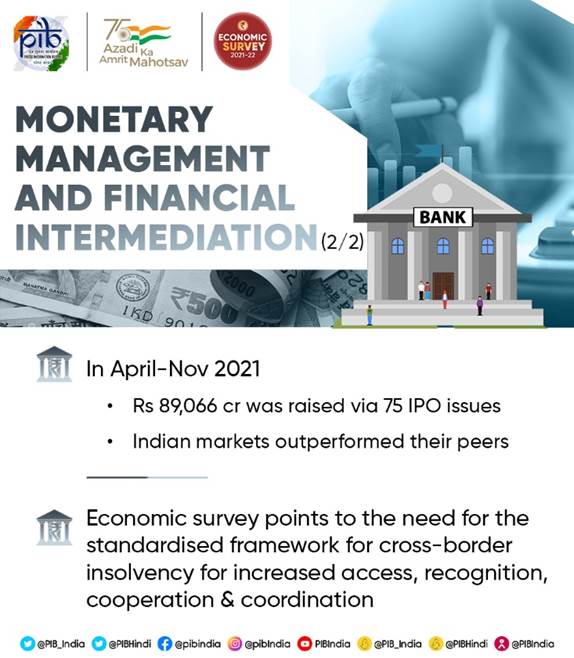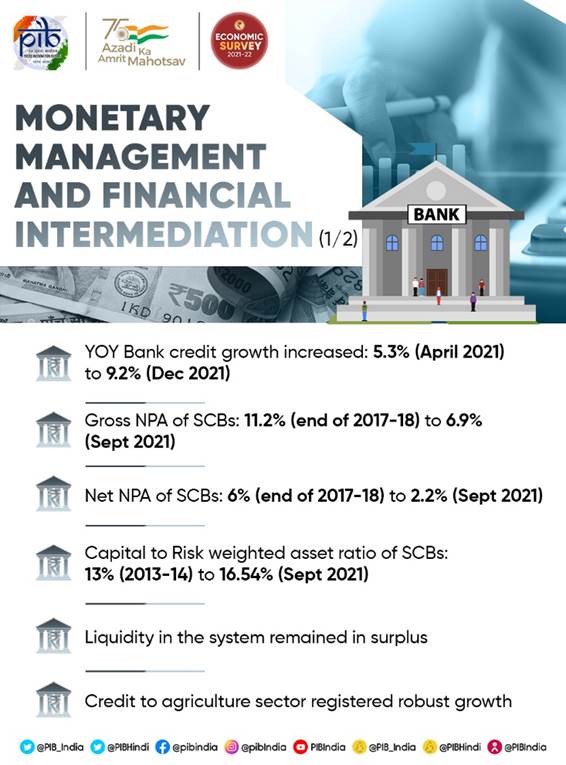Ministry of Finance
ECONOMIC SHOCK OF THE PANDEMIC HAS BEEN WEATHERED WELL BY COMMERCIAL BANKING SYSTEM SO FAR SAYS THE ECONOMIC SURVEY
PERSONAL LOANS REGISTERS DOUBLE DIGIT GROWTH OF 11.6%
AGRICULTURE CREDIT REGISTERS ROBUST GROWTH @10.4%
MSMES CREDIT GROWTH ACCELERATES TO 12.7%
4.6 BILLION TRANSACTIONS WORTH Rs 8.26 LAKH CRORE BY UPI: RISE OF 504.5 PER CENT IN FUND MOBILIZATION BY EQUITY IN 2021
OVERALL CONTRIBUTION UNDER NPS GROWS BY MORE THAN 29%
Posted On:
31 JAN 2022 2:58PM by PIB Delhi
“The economic shock of the pandemic has been weathered well by the commercial banking system so far, even if some lagged impact is still in pipeline” says the Economic Survey 2021-22; tabled by the Union Finance and Corporate Affairs Minister Smt. Nirmala Sitaraman in the Parliament today. The Survey also notes that the bank credit growth stands at 9.2 per cent as on 31st December 2021.
Growth in personal loans improved to double digits:
The Survey highlights that the growth in personal loans improved to 11.6% as compared with 9.2% in the previous year. Housing loans, the largest constituent of personal loans, registered growth of 8 per cent in November 2021. The growth of vehicle loans, the second largest constituent, improved to 7.7 per cent in November 2021 from 6.9 per cent in November 2020.
Credit Growth:
The Survey states that the credit to Agriculture continued to register robust growth, and was at 10.4 per cent (YoY) in 2021 as compared with 7 per cent in 2020. Credit growth to micro & small industries accelerated to 12.7 per cent in 2021 from 0.6 per cent a year ago, reflecting effectiveness of various measures taken by the Government and the RBI to boost credit flow to the micro, small and medium enterprises (MSME) sector.
Monetary Transmission:
According to the Survey, Large surplus systemic liquidity, forward guidance of continuing with the accommodative stance and the external benchmark system for pricing of loans in select sectors aided monetary transmission.
Factoring in India:
The Survey states that, Factoring is an important source of liquidity worldwide, especially for MSMEs. Hence, the Factoring Regulation (Amendment) Act, 2021 was enacted with the amendments in line with the recommendations of UK Sinha Committee. The significant regulations pertaining to the amendment act has been notified by the RBI in January 2022. The amendments have liberalized the restrictive provisions in the Act and at the same time ensure that a strong regulatory / oversight mechanism is in place under RBI. Overall, this change would lead to widening of factoring ecosystem in the country and help MSMEs significantly, by providing added avenues for availing credit facility.
Deposit insurance in India:
The Survey asserts that The Deposit Insurance and Credit Guarantee Corporation (Amendment) Act, passed by the Parliament in 2021, made significant changes in the landscape of deposit insurance in India. The Survey also notes that Bank-group wise, the percentage of insured deposits vis-à-vis total deposits is 84 per cent for RRBs, 70 per cent for cooperative banks, 59 per cent for SBI, 55 per cent for PSBs, 40 per cent for private sector banks and 9 per cent for foreign banks. Up to 31st March 2021, a cumulative amount of Rs 5,763 crores has been paid towards claims since the inception of deposit insurance (Rs 296 crore in respect of 27 commercial banks and Rs 5,467 crores in respect of 365 co-operative banks).
Digital payments:
According to the Survey, Unified Payments Interface (UPI) is currently the single largest retail payment system in the country in terms of volume of transactions, indicating its wide acceptance In December 2021, 4.6 billion transactions worth Rs 8.26 lakh crore were carried out by UPI. RBI and the Monetary Authority of Singapore announced a project to link UPI and PayNow, which is targeted for operationalization by July 2022, Bhutan recently became the first country to adopt UPI standards for its QR code. It is also the second country after Singapore to have BHIM-UPI acceptance at merchant locations.
NBFCs:
The Survey states that the total credit of NBFC sector increased marginally from Rs 27.53 lakh crore in March 2021 to Rs 28.03 lakh crore in September 2021. The credit intensity of NBFCs, measured by NBFC credit as a ratio of GDP has been rising consistently and stood at 13.7% at end March 2021. Industry remained the largest recipient of credit extended by the NBFC sector, followed by retail loans and services.
Equity:
The Survey observes that In April-November 2021, IPOs of 75 companies have listed, garnering Rs 89,066 crore, as compared to 29 companies raising Rs 14,733 crore during April-November 2020, indicating stupendous rise of 504.5 per cent in fund mobilization. The money raised by IPOs has been greater than what has been raised in any year in last decade by a large margin. Amount raised by way of preferential allotment increased by 67.3 per cent during April-November 2021, as compared to previous year. Overall, during April-November 2021, Rs 1.81 lakh crore have been raised through equity issues through diverse modes viz., public offerings, rights, QIP and preferential issues.

Mutual Fund Activities:
The Survey highlights that the net Assets under Management (AUM) of mutual fund industry rose by 24.4 per cent to Rs 37.3 lakh crore at the end of November 2021 from Rs 30.0 lakh crore end of November 2020. Net resource mobilization by mutual funds was Rs 2.54 lakh crore during April-November 2021, as compared to Rs 2.73 lakh crore during April-November 2020.
PENSION SECTOR:
The Survey appreciates the fact that the total number of subscribers under New Pension Scheme (NPS) and Atal Pension Yojana (APY) increased from 374.32 lakh as on September 2020 to 463 lakh as on September 2021, recording a growth of 23.7 per cent over the year. The overall contribution under NPS grew by more than 29 per cent during the period September 2020 - September 2021. Maximum growth in contribution was registered under All Citizen model (51.29 per cent) followed by Corporate Sector (42.13 per cent), APY (38.78 per cent), State Government Sector (28.9 per cent), and Central Government Sector (22.04 per cent). The Assets under Management (AUM) of NPS and APY stand at Rs 6.67 lakh crore at end September 2021 and thereby recorded an overall growth (YoY) of 34.8 per cent. The gender gap in enrolments under APY has narrowed down with increased participation of female subscribers, which has increased from 37 per cent as of March 2016; to 44 per cent as of September 2021.
SCHEDULED COMMERCIAL BANKS (SCBS):
The Survey observes that the Gross Non-performing Advances (GNPA) of the SCBs reduced to 6.9% in the year 2021, the Net Non-performing advances (NNPA) stands @2.2% Restructured Standard Advances (RSA) ratio of SCBs increased from 0.4 per cent to 1.5 per cent. Overall, the Stressed Advances ratio of SCBs increased to 8.5% at end September 2021. The Survey claims that COVID-19 related dispensations/moratoriums provided with respect to asset quality contributed towards increase in restructured assets and as a result, stressed advances ratio.

Public Sector Banks (PSBs):
The Survey highlights that the GNPA decreased to 8.6 per cent at end-September 2021, The Stressed Advances ratio of PSBs increased to 10.1 per cent during the same period on account of rise in restructured advances. Based on the capital position as on September 30, 2021, all Public Sector and Private Sector banks maintained the Capital Conservation Buffer (CCB) well over 2.5 per cent.
****
RM/ YKB/BD
(Release ID: 1793812)
Visitor Counter : 2516